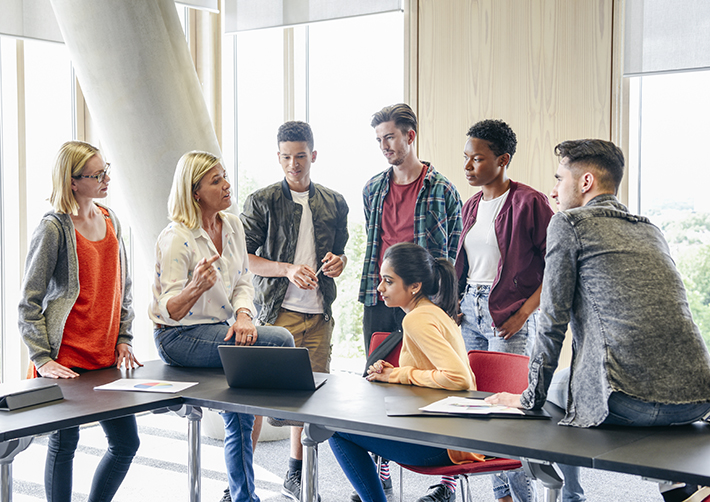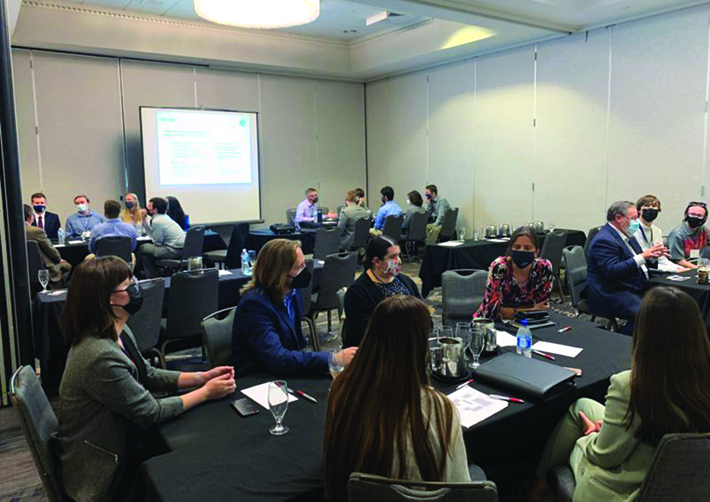
NextGen: Emerging Professionals Program, Scholarships, and More
Emerging Professionals Program Plans Committee Week Workshops
The Emerging Professionals Program will continue in its eighth year in 2022 with four workshops planned to be held during committee weeks. The workshops are slated for June 14, June 28, Oct. 18, and Nov. 1 in Seattle, Washington, and New Orleans, Louisiana.
The EP Program aims to provide a potentially long-term opportunity for members who have demonstrated the potential to be industry and committee leaders. The program supports two days of attendance at a committee week to participate in the workshop. The EP workshop offers a comprehensive introduction to ASTM and its standards process as well as leadership and skills development.
Candidates for the program must meet these criteria:
- One to five years’ experience in standards development or in using ASTM standards in their work;
- Work for a company, association, or government agency that is currently using and/or developing ASTM standards or attends a university (graduate level or higher) where their work involves/contributes to a significant ASTM activity;
- Is available to attend the duration of the EP workshop and participate in a technical committee meeting; and
- ASTM International membership for at least one year, which is required for the candidate and mentor. Student membership is acceptable for the nominee.
As of this year, 214 members representing one or more of 95 technical committees have participated in the program. Many are officers and several have received awards from their committees. In 2021, three virtual workshops were held for 29 EPs representing 34 different ASTM technical committees.
For more information, including how to nominate a participant, contact Katerina Koperna at kkoperna@astm.org.
As the new year begins, a new group of ASTM International members will be participating in the Emerging Professionals Program.
One Candidate's Experience:
Carla Divieto, who participated in the program in November 2016, is a member of the committee on medical and surgical materials and devices (F04). Divieto is a scientific researcher at INRIM, the Italian Metrological Research Institute. She is familiar with standards from her research, which is based on the use of standards.
“We need standardized measurement protocols and guidance in different fields of application such as materials science, nanoscience, physics, biology, and medicine,” she explains. “On my research team, the Metrology for Biosciences Lab within the biomedical metrology sector, we apply standards in the field of cells- and DNA-based measurements, and in regenerative medicine and tissue engineering. We rely on standards to perform in vitro tests on 2D and 3D cell cultures on scaffolds to study cellular phenomena — such as cell proliferation or biomaterials cytotoxicity — and the production of scaffolds — such as hydrogels — for cardiac regeneration or polymeric scaffolds for cartilage regeneration.”
“Everything started with ASTM thanks to Liisa Khun, an ASTM member and coordinator of F04.42, biomaterials and biomolecules for TEMPs [tissue-engineered medical products],” Divieto says. “I was working on similar topics, so Liisa involved my lab in an interlaboratory comparison between her group and my group to demonstrate the robustness of the method proposed.” That collaboration on a now-published standard led to a collaboration on another standard that grew from research by Divieto and her colleagues. Now that standard, the practice for quantifying cell proliferation in 3D scaffolds by a nondestructive method (F3504), is also published.
Of her experience with the EP Program, Divieto summarizes, “I received a very good and comprehensive introduction to ASTM, to the process of standards development, and on how to develop good leadership skills.” She adds, “The training strategy was very good, alternating theoretical notions to practical examples and demonstration.” She also attended meetings of her committee with Kuhn.
Overall, Divieto feels her involvement has been rewarding. “The development process is very enriching in terms of developing skills through contacts with experts, and developing skills such as how to make an experimental protocol simple and understandable but at the same time precise and detailed,” she says.
Project Grant Winners Announced
Five university students and teams have been awarded $500 ASTM International project grants. Such grants are offered each year to college students who are working on academic projects that involve standards. The following students and projects have won grants (relevant ASTM committees are noted in parentheses).
01
Caleb Bavash and team, Anna University, 3D Printing of Bio-Ceramic Scaffolds Using Hydroxyapatite from Egg Shells and Hap-Based Bio-Composite (committees on medical and surgical materials and devices, F04; additive manufacturing technologies, F42; and environmental assessment, risk management, and corrective action, E50).
02
Elisabeth Martin and team, University of Illinois, Language Lifeline Medical Interpretation Application (committees on occupational health and safety, E34; and language services and products, F43).
03
Amanda Coogan, Rochester Institute of Technology, BalanX Exercise Machine for People with Balance Impairments V2 (committee on sports equipment, playing surfaces, and facilities, F08).
04
R.S. Krishna, Veer Surendra Sai University of Technology, Prediction of Graphene Reinforced Geopolymer Composite (GRGC) properties using Artificial Neural Network (ANN) (cement, C01; concrete and concrete aggregates, C09).
05
Amber Witt and team, Drexel University, Supplemental Support Speculum (committee on plastics, D20).
For more information on ASTM Project Grants contact Travis Murdock at tmurdock@astm.org.
Society for Standards Professionals Offers Scholarship
The Society for Standards Professionals (SES) is again offering a $1,000 scholarship to students who study standards in their academic curriculum, as it has since 2017. The scholarship is intended to support students who will help SES achieve its mission of increasing the awareness and use of standards.
Full time undergraduates or graduate students who use standards in their academic curriculum at a college or university are eligible to apply for the scholarship. The scholarship committee uses the following criteria in choosing a winner:
- Academic achievement;
- Leadership qualities;
- Concern for others/volunteerism;
- Demonstrated use of standards in academic curriculum;
- Demonstrated importance of standards in future career goals.
Applications for the SES student scholarship are due April 24. More information HERE.

The amusement rides and devices committee (F24) held its student/industry roundtable event at the close of its November 2021 meetings in Albuquerque, New Mexico. The roundtable has been a mutually beneficial event to connect industry experts with the next generation for the purposes of providing insight and tips to students, as well as to allow industry professionals to help develop the future workforce of their industry.
 SN Home
SN Home Archive
Archive Advertisers
Advertisers Masthead
Masthead RateCard
RateCard Subscribe
Subscribe Email Editor
Email Editor